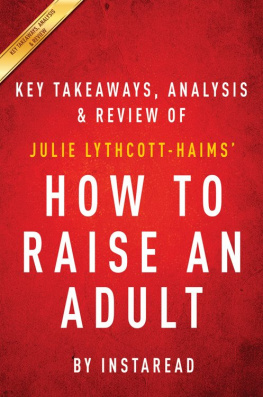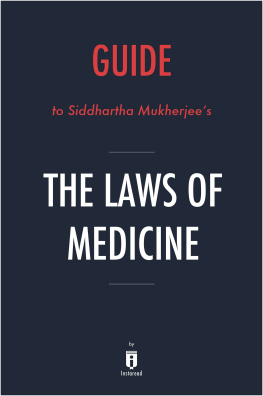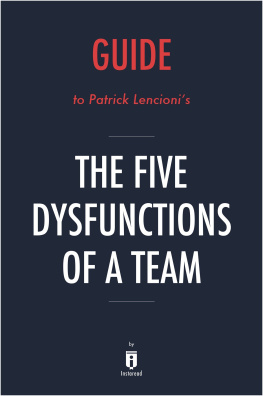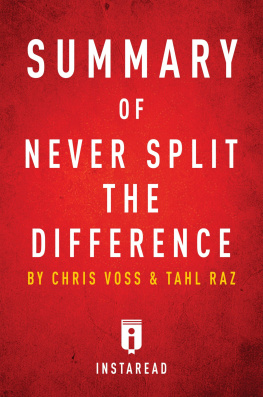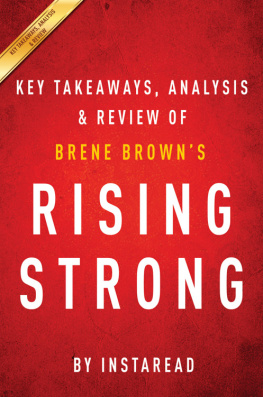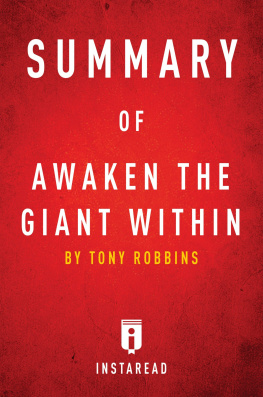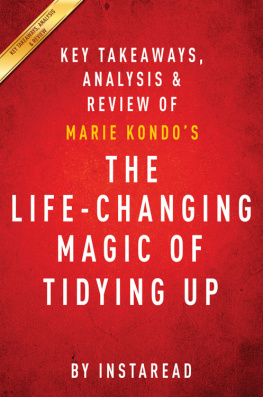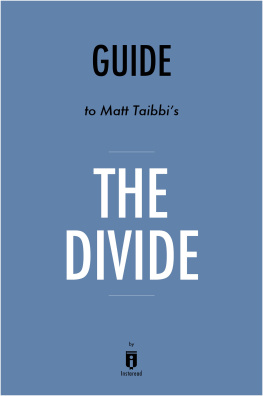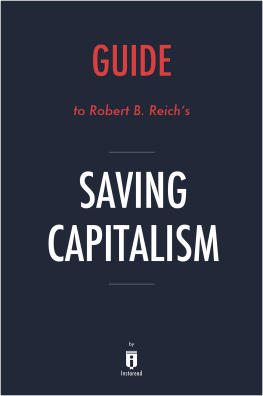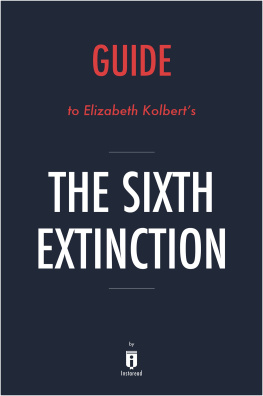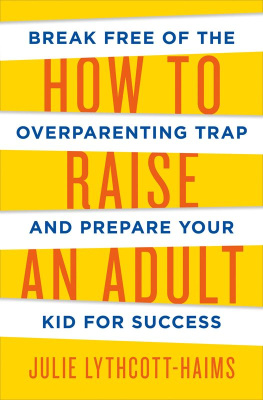How to Raise an Adult
Break Free of the Overparenting Trap and Prepare Your Kid for Success
By Julie Lythcott-Haims
Key Takeaways, Analysis & Review
By Instaread
Please Note
This is Key Takeaways, Analysis & Review.
Copyright 2015 by Instaread. All rights reserved worldwide. No part of this publication may be reproduced or transmitted in any form without the prior written consent of the publisher.
Limit of Liability/Disclaimer of Warranty: The publisher and author make no representations or warranties with respect to the accuracy or completeness of these contents and disclaim all warranties such as warranties of fitness for a particular purpose. The author or publisher is not liable for any damages whatsoever. The fact that an individual or organization is referred to in this document as a citation or source of information does not imply that the author or publisher endorses the information that the individual or organization provided. This concise summary is unofficial and is not authorized, approved, licensed, or endorsed by the original books author or publisher.
Table of Contents
OVERVIEW
IMPORTANT PEOPLE
KEY TAKEAWAYS
ANALYSIS
Key Takeaway 1
Key Takeaway 2
Key Takeaway 3
Key Takeaway 4
Key Takeaway 5
Key Takeaway 6
Key Takeaway 7
Key Takeaway 8
Key Takeaway 9
AUTHORS STYLE
AUTHORS PERSPECTIVE
REFERENCES
Thank you for purchasing this Instaread ebook
Download the Instaread app and get unlimited summaries of NYTimes Bestsellers.
CLICK HERE TO LEARN MORE
OVERVIEW
How to Raise an Adult: Break Free of the Overparenting Trap and Prepare Your Kid for Success is a book of parenting advice. The author, Julie Lythcott-Haims, is a former freshman dean at Stanford University and the mother of two teenagers.
While at Stanford University, Lythcott-Haims noticed that her students lacked life skills. They could not care for themselves, they had no grit, and they did not know what they wanted to be or how to be an adult. She saw parents accompanying students on campus, doing their work for them, and applying for jobs on their behalf. Lythcott-Haims concluded that parents, in an attempt to give their children every opportunity and help them get into the best school, were overparenting to the degree that they were not raising independent adults.
Parents want to keep their children safe, and provide opportunities. They want them to go to the best colleges. Top universities today are very competitive and the economy presents challenges. To ensure success, parents overparent, creating a family dynamic that results in stressed children who do not have the skills to get through life and are very anxious, as well as stressed parents who do not have lives of their own. By changing the way parents raise their children, as well as changing ideas of success and the college process, parents can push back against the tide of overparenting and save themselves and their children.
IMPORTANT PEOPLE
Julie Lythcott-Haims: Julie Lythcott-Haims is a former dean of Stanford University, and a graduate of Stanford and Harvard Law School. She lives in Palo Alto, California, with her husband and two teenage children.
Sawyer: Sawyer is Lythcott-Haimss son, who was treated for Attention Deficit Hyperactive Disorder (ADHD). He is used in this book frequently as an example of Lythcott-Haimss experience as a parent in Palo Alto with a millennial child.
Avery: Avery is Lythcott-Haimss daughter.
Rachel: Rachel is a young woman from a wealthy Conservative Jewish family in Los Angeles whose parents did everything for her. She is an example of a child whose overparenting set her on the path to addiction.
Lawrence Larry Momo: Lawrence Momo is the director of college counseling at the preparatory school Trinity in New York and the former admissions dean at Columbia University. Like many others, he believes that the system of college applications and standardized testing is broken.
Bill Deresiewicz: Deresiewicz is the author of Excellent Sheep: The Miseducation of the American Elite and the Way to a Meaningful Life , a book about how learning and happiness are sacrificed to create students at elite schools.
KEY TAKEAWAYS
- Baby boomers grew up in a time of unprecedented success. They want to give their children opportunities and counter the way they were parented, but times have changed.
- The world is not as unsafe as it seems, but society operates as though there are dangers to children waiting around every corner.
- Childhood has become very scheduled in order for a child to succeed on a very limited path that negatively impacts a childs development. Children need unstructured time to grow, learn, and think for themselves.
- Children learn through failure, responsibility, and mastery. When parents do everything for their children, they deny children the upside of failure and the ability to develop grit.
- The college process is rigged in a way that creates undue stress and unrealistic expectations about the right schools. Parents must have a wider mindset about colleges.
- Children who are overparented are completely unprepared for the challenges and responsibilities of the job market and living alone. Parents need to teach independence.
- Parents should strive for the authoritative parenting style instead of the authoritarian and permissive/indulgent styles common in millennial households.
- The immense pressure young people face has led to the rise of study drugs.
- Parents must let go of their egos and back off from their children. They can be better parents by reclaiming themselves and by being the people they want to be.
Thank you for purchasing this Instaread ebook
Download the Instaread app and get unlimited summaries of NYTimes Bestsellers.
CLICK HERE TO LEARN MORE
ANALYSIS
Key Takeaway 1
Baby boomers grew up in a time of unprecedented success. They want to give their children opportunities and counter the way they were parented, but times have changed.
Analysis
Baby boomers, the generation born after World War II, grew up often as latch-key kids to laissez-faire parents. When they came of age, they were beneficiaries of a booming economy that allowed them to do better than their parents. However, Millennials, or people between the ages of 18 and 34 in 2015, have more competition when applying to elite colleges and, after college, face an uncertain job market. To overcompensate for the way they were parented, and in an attempt to ensure their childrens success, boomers tend to overparent. They assume that their children need to compete with other children to succeed.
There is a lot of evidence of the less stable times that todays children are growing up in. The millennial generation is the first generation in US history to be worse off than their parents generation. According to a Pew Research study, this is because they are often saddled with student debt. Thirty-seven percent of US households with adults under 40 have student debt. Those with student loans have a net worth of $8,700 compared to $64,700 for those without student debt. These people are also less likely to own a home. According to a study by the National Association of Realtors, fewer than 25 percent of 30 year olds are home owners, as compared to 80 percent of baby boomers [1]. This disparity causes anxiety in parents, who want to ensure the best for their children and see only very set pathways to ensure this success.
Key Takeaway 2
The world is not as unsafe as it seems, but society operates as though there are dangers to children waiting around every corner.
Next page
